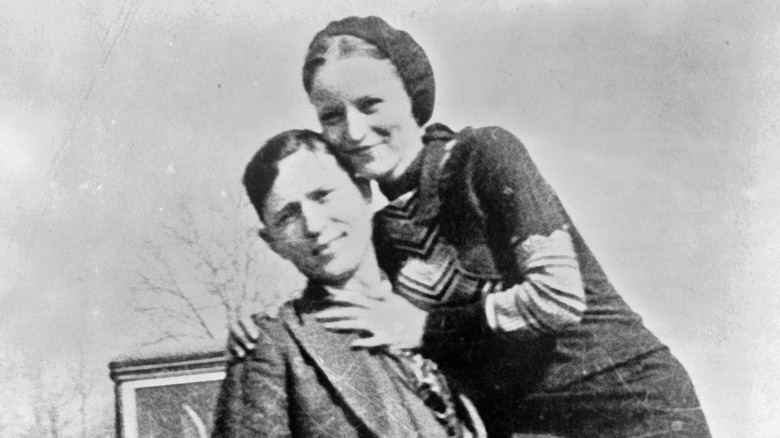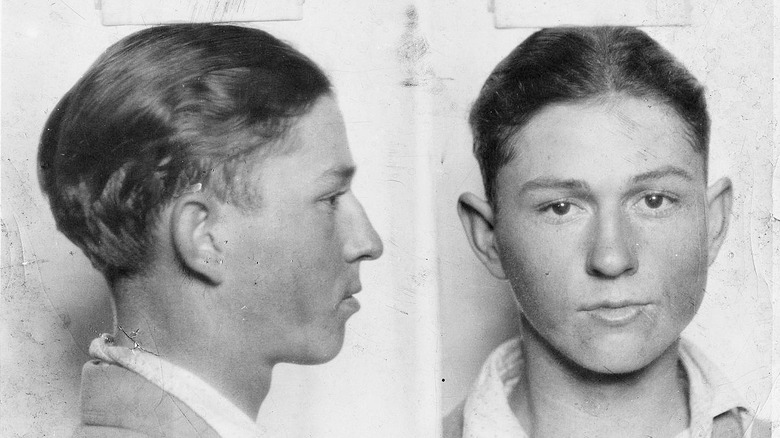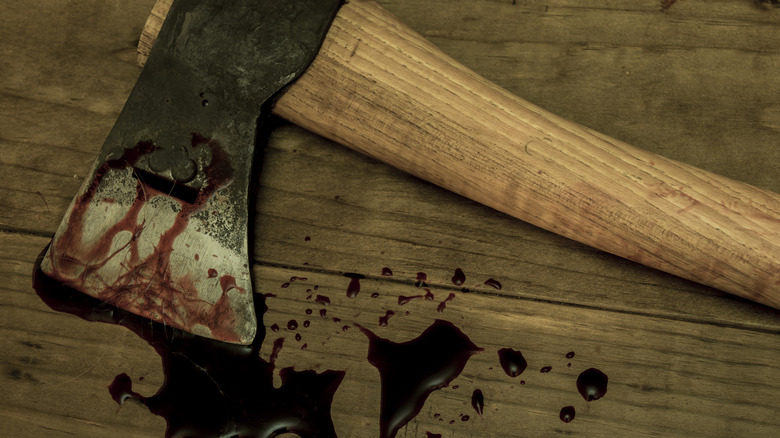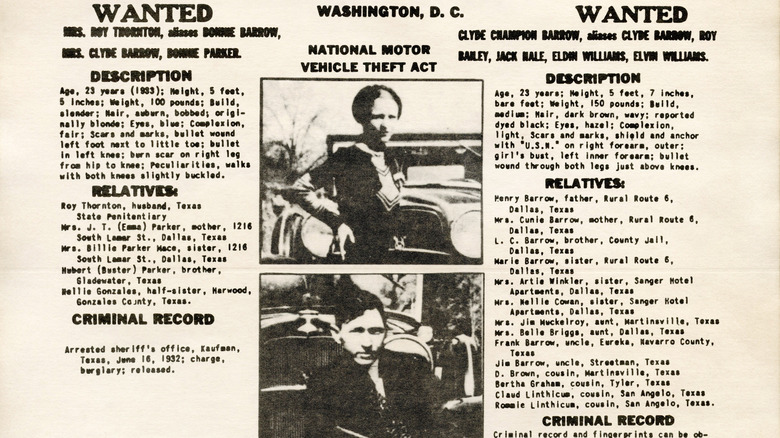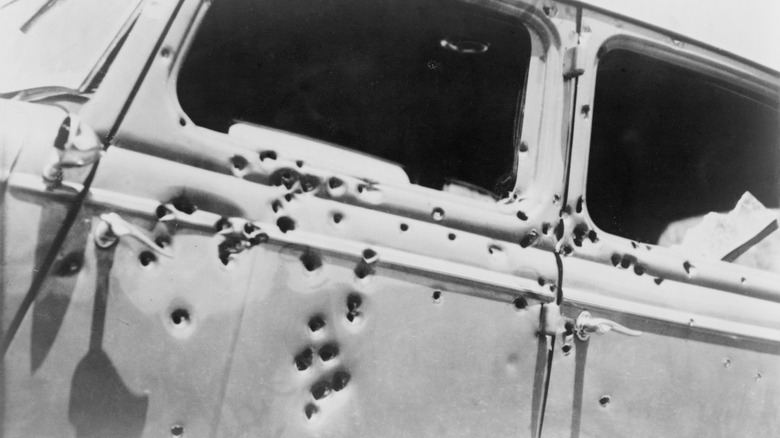What Bonnie And Clyde's Life In Prison Was Really Like
The grisly end of Bonnie Parker and Clyde Barrow came in an ambush by law enforcement along a dusty back road in rural Bienville Parish, Louisiana in the spring of 1934, helping to turn their lives into legend. They are best known for their romance that bloomed amid a bloody rampage across America during the Great Depression, but they also both spent time behind bars, experiences that helped shape their short lives. In the case of Barrow, this was especially true. Just after meeting Parker, he went to prison and the hellish conditions warped him. After his release, he sought revenge on the institution and any law enforcement officer who got in his way.
During his incarceration, Clyde Barrow committed a brutal murder, killing an older psychopathic inmate who had beaten and raped him over and over for almost a year. Barrow quickly went from small-time hood to killer. Bonnie also spent a short time in jail in 1932, during which she wrote poetry and temporarily lost her faith in Barrow. But after a grand jury dismissed her case, she returned to a life of crime with her lover.
Clyde Barrow's first time behind bars
In February 1930, a few weeks into Clyde Barrow and Bonnie Parker's romance, the police caught up with the young man, who admitted to a number of burglaries and car thefts. He began serving a two-year sentence at the McLennan County Jail in Waco, Texas, in early March — a few weeks shy of his 21st birthday. But he didn't stay long. On the night of March 11, he and two other inmates broke out of the prison using a gun Parker smuggled in for her new boyfriend. Per the Waco Times-Herald, when the jailer opened the cell to give one of the prisoners a bottle of milk, he was met with a gun pointed at him and the chilling words, "Stick 'em up."
The fugitives made it all the way to Ohio before the law recaptured them. The judge overseeing Barrow's case had initially allowed him to serve his convictions concurrently, but after the jail break, the magistrate resentenced the young tough to a consecutive sentence of 14 years. Officials moved Barrow from the relatively cushy jail in Waco to one of the most notorious prison farms in the country: Eastham State.
Barrow's hellish time at a Texas farm prison
At Eastham State, Clyde Barrow quickly learned just how brutal life behind bars could be. The prison was a working farm where the prisoners had to run to and from the fields where they weeded and picked corn and cotton or risked a beating from guards. But for Barrow, it wasn't the guards, but a fellow inmate, who tormented him beyond human endurance. The man, a robber named Ed Crowder, was 29, large, tough, and evil-minded. He oversaw the dormitory where Barrow lived.
Barrow was 5-foot-7, weighed 150 pounds, and seemed even younger — the newspapers nicknamed him "Schoolboy" because of this. And he was no match for Crowder. The older man beat and raped Barrow on a regular basis for months, and neither the guards nor his fellow prisoners intervened. Eventually, Barrow had had enough. He hid a lead pipe in his pant leg, lured Crowder into the bathroom, and crushed his skull. Aubrey Skelley, another prisoner who also hated Crowder, took the rap for the crime and a grand jury chalked it up to self-defense.
Barrow permanently maimed himself to get out of work
Besides the back-breaking farm work at Eastham State Farm, the inmates had little to eat — rancid bacon was common fare — and were at the mercy of sociopathic corrections officers. The guards would stick naked prisoners in tiny tin shacks in the broiling Texas heat as punishment for bad behavior. Worse, they would sometimes cover them in honey to attract bugs.
Even though he was considered a model prisoner, while there Clyde Barrow cut off two of his toes with an ax so he wouldn't have to perform the brutal farm work prisoners were forced to endure (it's unclear if he did it to himself or had someone else perform the deed). The authorities sent him to the prison hospital and just two weeks later, in February 1932, he was paroled. Barrow hated the prison farm so much that in January 1934 he, Bonnie Parker, and their gang raided it, helping five inmates escape. He had first hatched the plan while he was incarcerated there.
Bonnie Parker's short stint in jail
Not long after Clyde Barrow's release from prison in 1932, following a short attempt at the straight life, he, Bonnie Parker, and a rotating roster of gang members began robbing banks and other businesses, stealing cars, and kidnapping law officers. But in April 1932, after making off with two vehicles in Tyler, Texas a posse gave chase and captured Parker and another member of the gang. Parker spent the next two months in the Kaufman County Jail. She spent her time writing poetry and her jailer would often allow her to sit outside on the lawn. But she was lonely and scared too.
She had lied to the authorities, telling them she'd been kidnapped, and did her best to wait patiently for the grand jury to hear her case. Barrow had escaped, and while his family visited Parker in jail, providing her with food and clothing, she wasn't happy with the situation. She promised her mother she was through with Clyde Barrow. But in mid-June 1932, the grand jury decided not to indict Parker and she walked free.
It's death for Bonnie and Clyde
Neither Bonnie Parker nor Clyde Barrow would ever see the inside of a cell again. Following her release from jail, the pair's crimes escalated. They left a trail of dead law enforcement officers in their wake as they blasted and robbed their way through the Southwest and the Heartland. By the time of the ambush that killed them on May 23, 1934, they were blamed for at least 13 murders plus numerous other crimes.
As the pair blazed a path into the history books, Parker continued writing poetry, including "The Ballad of Bonnie and Clyde," which foreshadowed their deaths in the final lines (via History Matters): "Some day they'll go down together / And they'll bury them side by side / To few it'll be grief, to the law a relief/ But it's death for Bonnie and Clyde." While the pair was inseparable during their rampage across the country for the last two years of their lives, in death, the families of Bonnie and Clyde buried them in separate cemeteries in Dallas against their express wishes.
If you or anyone you know has been a victim of sexual assault, help is available. Visit the Rape, Abuse & Incest National Network website or contact RAINN's National Helpline at 1-800-656-HOPE (4673).
